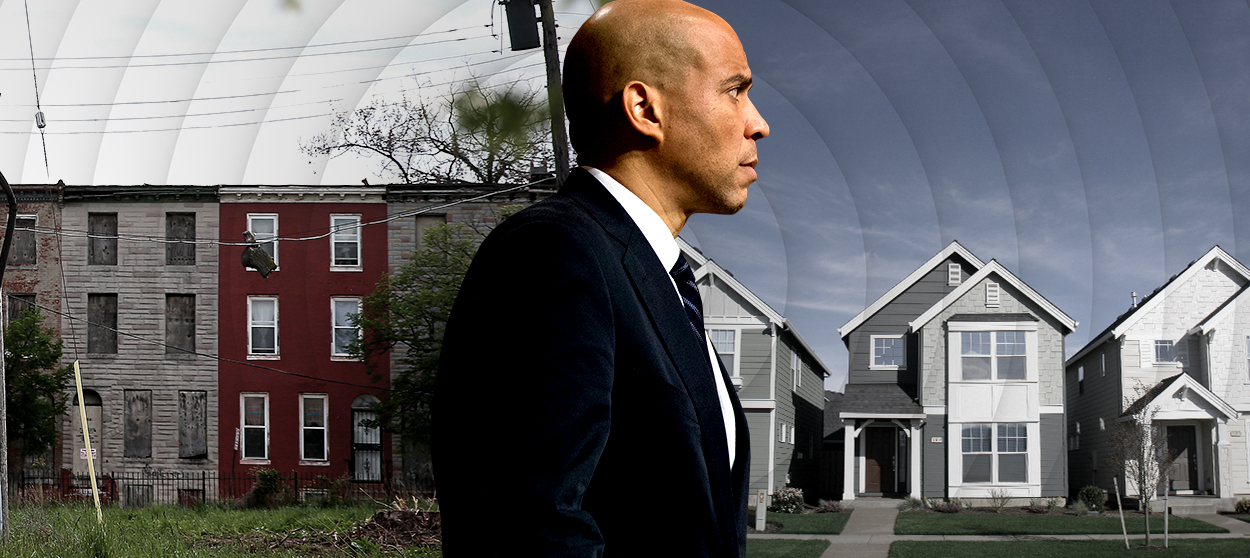When targeting aid is justified
Cory Booker wants to give more money to poor children. This is not blasphemy.


A free daily email with the biggest news stories of the day – and the best features from TheWeek.com
You are now subscribed
Your newsletter sign-up was successful
Democrats are getting ready for 2020 by thinking big. They're pushing ideas like Medicare-for-All, a job guarantee, a massively expanded Earned-Income Tax Credit (EITC), and more. But as the party works through its new economic policy ambitions, it will have to make important technical decisions.
For instance, most big government programs involve means-testing. That's where aid cuts off or phases out for Americans higher up the income ladder. Medicaid, ObamaCare's subsidies, the aforementioned EITC, SNAP, housing vouchers, and more all operate like this. Democrats are split on the merits of the approach, but they'll eventually have to make decisions about it.
A new big-idea bill from Sen. Cory Booker (D-N.J.) poses the question of means-testing in an especially useful way.
The Week
Escape your echo chamber. Get the facts behind the news, plus analysis from multiple perspectives.

Sign up for The Week's Free Newsletters
From our morning news briefing to a weekly Good News Newsletter, get the best of The Week delivered directly to your inbox.
From our morning news briefing to a weekly Good News Newsletter, get the best of The Week delivered directly to your inbox.
Booker's proposal is sweeping: Give every child in the country seed capital that, once they reach adulthood, they can use to go to college, buy a home, start a business, or build wealth in other ways. All American children would get at least $1,000 at birth. But yearly contributions to age 18 would kick in for children from lower income households. The poorest children would turn 18 years old with an interest-earning nest egg of $50,000. (The contributions would also be indexed to rise with inflation.)
It's a grand idea, based on the "baby bonds" proposed by economists Darrick Hamilton and William Darity, of the New School and Duke University, respectively.
But as you can see, Booker's proposal also involves means-testing. And this provoked some progressive skepticism.
Means-testing cuts down on government spending. It also just seems logical: Don't we want to focus aid on the people who need it the most?
A free daily email with the biggest news stories of the day – and the best features from TheWeek.com
But progressives also see costs. Targeting benefits at some people can single them out for stigma and cuts against the kind of broad social solidarity the left aims for. It can make aid programs much more complicated and difficult to navigate for the beneficiaries. And means-testing can make programs more politically vulnerable: If only a specific group of less-privileged Americans benefit from a program, politicians may be more willing to cut it.
For that reason, many progressives push for universality in aid programs. The universal basic income (UBI) is the ultimate example of this approach. But you can also think of proposals like free college-for-all or Medicare-for-All.
Traditionally, American policy has embraced means-testing for programs that provide income or cash-equivalent assistance to buy life's necessities. (Again, think EITC, SNAP, and ObamaCare subsidies.) But those policies probably are the uses for which means-testing is the least appropriate, for all the reasons progressives lay out.
However, there's an important distinction to Booker's bill: It's not trying to help people survive. It's trying to reduce inequality in wealth — the claims people have to real estate, stock, investments, and such.
Wealth inequality is even worse than income inequality: The top 1 percent of Americans control 35 percent of all wealth, and the top 10 percent control 76 percent. When it comes to race, the median white family had $141,900 in wealth in 2013. The median black family had a mere $11,000.
The two forms of inequality aren't totally separate: Wealth generates income and more income allows you to buy more wealth. But wealth is also about power. Yes, wealth gives people the ability to buy health care, go to school, hire a lawyer, or start a small business. But if you own part of a company, you also get a voice in its hiring and compensation policies. If you own a piece of real estate, you get to decide who builds on it, what they build, and how much people pay in rent. Wealth gives people decision-making power in how the U.S. economy is structured and how it evolves. If you want to understand gentrification, for instance, begin with the fact that poor nonwhite Americans rarely have property claims over the places and buildings they live in.
"A lot of times we think of wealth as an outcome," Hamilton told The Week. "But it's also an input, or a beginning. It allows people to have agency, particularly financial agency, over their lives. With wealth, we're able to make choices. ... If you lack wealth, you don't have choices."
Here's the other thing about power: It's often zero-sum. If you control all of a company, the only way for another person to attain voting rights is for you to give them up.
In other words, the problem with wealth isn't just that some people don't have enough. It's also that some people have too much. As Hamilton said, "Great inequality in wealth is the explanation for the plutocracy we have today."
The best way to tackle this problem is to raise the floor on wealth ownership without simultaneously raising the ceiling — which is what would happen if, say, we gave every child $50,000 in seed capital without means-testing. As Hamilton put it, this is about a universal birthright to capital. And the rich should be included in that social contract — but their inheritance largely takes care of that obligation. Hence, the design of Booker's bill.
Of course, it's worth considering how much universality a program needs to survive politically. But even here, Booker's bill looks strong. Medicaid is technically means-tested. But it has also proved popular enough to survive the Republican axe. Medicaid and CHIP cover about 35 million children. Bookers' bill would give between $11,000 and $71,000, after adjusting for inflation, to over 38 million children. (Medicaid also covers another 34 million adults, so the comparison isn't exact. But you get the point.) Booker's bill is also technically universal — every child gets at least $1,000 — so maybe the program would still help enough people that cutting it would become unimaginable.
None of this is to suggest that means-testing is always a great idea. But Booker's bill suggest it has its place. And Democrats need to think strategically about when to use it.
Jeff Spross was the economics and business correspondent at TheWeek.com. He was previously a reporter at ThinkProgress.
-
 Filing statuses: What they are and how to choose one for your taxes
Filing statuses: What they are and how to choose one for your taxesThe Explainer Your status will determine how much you pay, plus the tax credits and deductions you can claim
-
 Nan Goldin: The Ballad of Sexual Dependency – an ‘engrossing’ exhibition
Nan Goldin: The Ballad of Sexual Dependency – an ‘engrossing’ exhibitionThe Week Recommends All 126 images from the American photographer’s ‘influential’ photobook have come to the UK for the first time
-
 American Psycho: a ‘hypnotic’ adaptation of the Bret Easton Ellis classic
American Psycho: a ‘hypnotic’ adaptation of the Bret Easton Ellis classicThe Week Recommends Rupert Goold’s musical has ‘demonic razzle dazzle’ in spades
-
 The billionaires’ wealth tax: a catastrophe for California?
The billionaires’ wealth tax: a catastrophe for California?Talking Point Peter Thiel and Larry Page preparing to change state residency
-
 Bari Weiss’ ‘60 Minutes’ scandal is about more than one report
Bari Weiss’ ‘60 Minutes’ scandal is about more than one reportIN THE SPOTLIGHT By blocking an approved segment on a controversial prison holding US deportees in El Salvador, the editor-in-chief of CBS News has become the main story
-
 Has Zohran Mamdani shown the Democrats how to win again?
Has Zohran Mamdani shown the Democrats how to win again?Today’s Big Question New York City mayoral election touted as victory for left-wing populists but moderate centrist wins elsewhere present more complex path for Democratic Party
-
 Millions turn out for anti-Trump ‘No Kings’ rallies
Millions turn out for anti-Trump ‘No Kings’ ralliesSpeed Read An estimated 7 million people participated, 2 million more than at the first ‘No Kings’ protest in June
-
 Ghislaine Maxwell: angling for a Trump pardon
Ghislaine Maxwell: angling for a Trump pardonTalking Point Convicted sex trafficker's testimony could shed new light on president's links to Jeffrey Epstein
-
 The last words and final moments of 40 presidents
The last words and final moments of 40 presidentsThe Explainer Some are eloquent quotes worthy of the holders of the highest office in the nation, and others... aren't
-
 The JFK files: the truth at last?
The JFK files: the truth at last?In The Spotlight More than 64,000 previously classified documents relating the 1963 assassination of John F. Kennedy have been released by the Trump administration
-
 'Seriously, not literally': how should the world take Donald Trump?
'Seriously, not literally': how should the world take Donald Trump?Today's big question White House rhetoric and reality look likely to become increasingly blurred
